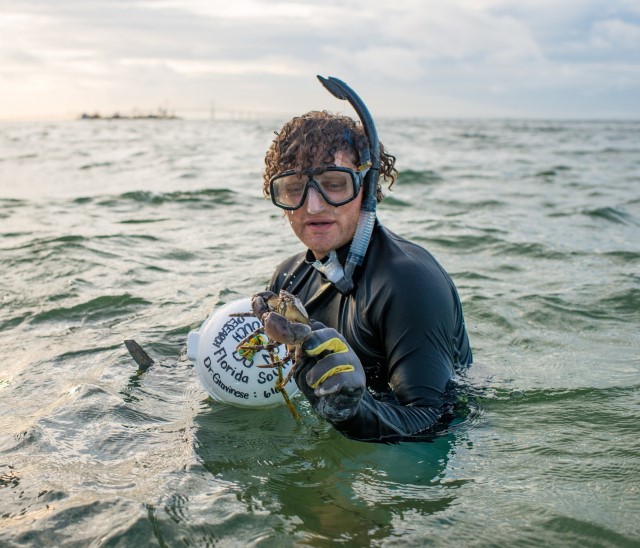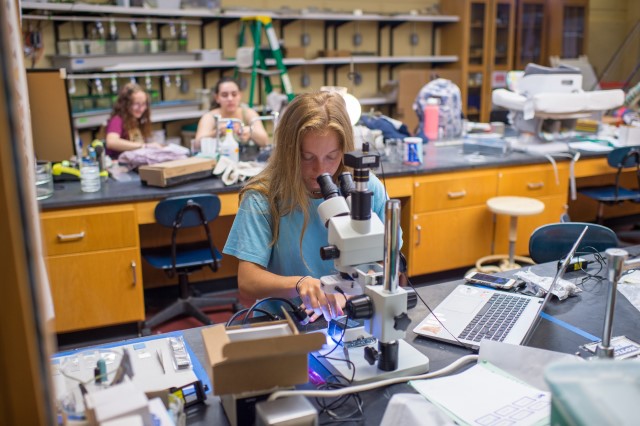Florida Southern College (FSC) and Louisiana State University (LSU) have been awarded a collaborative grant from the National Science Foundation (NSF) to conduct groundbreaking research on how climate change could impact one of Florida’s iconic fisheries, the Florida stone crab. The stone crab fishery is a $30 million commercial industry in Florida and supports over 800 jobs.

“The NSF’s recognition of the innovative work taking place within our marine biology program is rewarding and gratifying,” says Dr. Anne Kerr, president of FSC. “The research our biology, chemistry, and marine biology departments do is groundbreaking in many ways. Our community benefits from the brilliant minds of our professors who work together with our student-scholars in the field. It is experiences like this that will allow our students to present their work at scientific conferences, publish their data, form networks with other researchers and, ultimately, develop into outstanding scientists.”
The grant is nearly one million dollars and spans four years to investigate and model how rapidly changing ocean temperatures and pH levels disrupt stone crab larval development, behavior, and dispersal among habitats along the Florida coasts.

The NSF is an independent U.S. federal agency with a purpose to fund novel research that drives the U.S. economy and sustains U.S. global leadership. Dr. Philip Gravinese of FSC, a leading marine biologist, and Drs. Daniel Holstein and Zuo “George” Xue of LSU, forefront oceanography modelers, are the principal researchers leading the efforts for both institutions.
“Coastal habitats are experiencing rapid increases in temperature and are becoming more acidic, and we currently do not know how these environmental changes will impact many of our local fisheries, including stone crabs,” says Dr. Gravinese. Dr. Gravinese’s previous work has shown that stone crabs are sensitive to environmental stressors like temperature, pH, reduced oxygen, and even red tide. The annual stone crab harvest in Florida has decreased by roughly 30 percent since the 2000-2001 season, an absence of about 1 million pounds of claws per year, suggesting that fishing pressure and environmental stressors are having an impact on the fishery. Dr. Gravinese and his colleagues at LSU intend to forecast how looming climate changes will affect stone crab populations.

The NSF notes the remarkably integrative nature of the collaborative research venture. The joint institutional endeavor, consisting of cooperating faculty, undergraduate, and graduate student teams, will simultaneously draw on biological, chemical, environmental, ecological, and statistical data to create models that will serve to educate the public concerning the impact of climate changes on stone crab and other crustacean populations. Dr. Gravinese and his students will employ advanced, digital tracking software to monitor the behavioral patterns of stone crab larvae as they react to various changes in water acidification and temperature. Stone crab larvae can be sensitive to environmental stressors since they are still developing into juvenile crabs, and this sensitivity may change their swimming behaviors. The biological-behavioral data that the faculty-student teams from FSC gather will then be processed by teams at LSU to create biophysical and chemical oceanographic models that forecast how stone crab populations might shift in size and location in response to looming climate changes.
The NSF grant, totaling $922,033 and the first NSF grant awarded to FSC, will also fund the development of interactive K-12 curriculum. Dr. Gravinese is passionate about the public educational outcomes of his work. “Before I received my PhD, I served as a Florida public school educator for several years, and increasing ocean and climate literacy has always been a goal of mine,” he says. “I want to be a part of increasing students’ knowledge of how marine ecosystems function and react to environmental changes. If you get students excited about this kind of work in the K-12 window by engaging them with real-world science, it gives them an opportunity to be more informed and to make decisions that are helpful for their communities and our environment.”
About Florida Southern College
Founded in 1883, Florida Southern College is the oldest private college in the state. The College maintains its commitment to academic excellence through 70+ undergraduate programs and distinctive graduate programs in business administration, education, nursing, and physical therapy. Florida Southern has a 14:1 student-to-faculty ratio, is an award-winning national leader in engaged learning, and boasts 30 NCAA Division II National Championships. Florida Southern is ranked among the top 10 Regional Universities in the South by U.S. News & World Report in its 2022 “Best Colleges” guide and is included in The Princeton Review’s 2022 Best 387 Colleges guide, the Fiske Guide to Colleges 2022, and Forbes magazine’s “America’s Top Colleges.” The 2021-2022 Colleges of Distinction guidebook praises Florida Southern’s Barney Barnett School of Business and Free Enterprise, Ann Blanton Edwards School of Nursing and Health Sciences, and School of Education. Home to the world’s largest single-site collection of Frank Lloyd Wright architecture, FSC has appeared on The Princeton Review’s top 20 “Most Beautiful Campus” national listing for 12 consecutive years. Connect with Florida Southern College.
About Louisiana State University
With a coastal legacy dating back three-quarters of a century, LSU’s College of the Coast & Environment is at the forefront of today’s most pressing coastal and environmental issues. The college equips graduates with the multidisciplinary tools needed to address real-world coastal and environmental challenges. Our global research leads to a better understanding of the causes and impacts (unanticipated, forecasted, and actual) of these challenges and advances restoration strategies.






